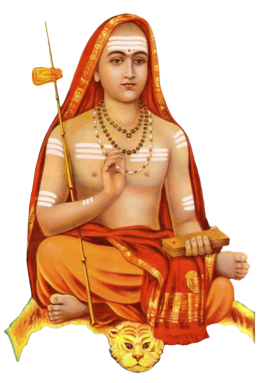स्वानन्दानुभवाच्छान्तिरेषैवोपरतेः फलम् ॥ ४१९ ॥
svānandānubhavācchāntireṣaivoparateḥ phalam || 419 ||
निवृत्तिः परमा तृप्तिरानन्दोऽनुपमः स्वतः ॥ ४२0 ॥
nivṛttiḥ paramā tṛptirānando’nupamaḥ svataḥ || 420 ||
यत्कृतं भ्रान्तिवेलायां नाना कर्म जुगुप्सितम्
पश्चान्नरो विवेकेन तत्कथं कर्तुमर्हति ॥ ४२१ ॥
yatkṛtaṃ bhrāntivelāyāṃ nānā karma jugupsitam
paścānnaro vivekena tatkathaṃ kartumarhati || 421 ||
प्रवृत्तिरज्ञानफलं तदीक्षितम् ।
तज्ज्ञाज्ञयोर्यन्मृगतृष्णिकादौ
नोचेद्विदां दृष्टफलं किमस्मात् ॥ ४२२ ॥
pravṛttirajñānaphalaṃ tadīkṣitam |
tajjñājñayoryanmṛgatṛṣṇikādau
nocedvidāṃ dṛṣṭaphalaṃ kimasmāt || 422 ||
अनिच्छोर्विषयः किं नु प्रवृत्तेः कारणं स्वतः ॥ ४२३ ॥
anicchorviṣayaḥ kiṃ nu pravṛtteḥ kāraṇaṃ svataḥ || 423 ||
अहंभावोदयाभावो बोधस्य परमावधिः
लीनवृत्तैरनुत्पत्तिर्मर्यादोपरतेस्तु सा ॥ ४२४ ॥
ahaṃbhāvodayābhāvo bodhasya paramāvadhiḥ
līnavṛttairanutpattirmaryādoparatestu sā || 424 ||
अन्यावेदितभोग्यभोगकलनो निद्रालुवद्बालवत् ।
स्वप्नालोकितलोकवज्जगदिदं पश्यन् क्वचिल्लब्धधीर्
आस्ते कश्चिदनन्तपुण्यफलभुग्धन्यः स मान्यो भुवि ॥ ४२५ ॥
anyāveditabhogyabhogakalano nidrāluvadbālavat |
svapnālokitalokavajjagadidaṃ paśyan kvacillabdhadhīr
āste kaścidanantapuṇyaphalabhugdhanyaḥ sa mānyo bhuvi || 425 ||
The enjoyer……merit—i. e. a most fortunate man.
Vivekachudamani – Introduction
1: Devoted Dedication
2: Glory of Spiritual Life
3: Unique Graces in Life
4-7: Miseries of The Unspiritual Man
8-13: Means of Wisdom
14-17: The Fit Student
18-30: The Four Qualifications
31: Bhakti – Firm and Deep
32-40: Courtesy of Approach and Questioning
41-47: Loving Advice of the Guru
48-49: Questions of the Disciple
50: Intelligent Disciple – Appreciated
51-55: Glory of Self-Effort
56-61: Knowledge of the Self-Its Beauty
62-66: Direct Experience – Liberation
67-71: Discussion on Questions Raised
72-75: Gross Body
76-82: Sense Objects a Trap – Man Bound
83-86: Fascination for Body Criticised
87-91: Gross Body Condemned
92: Organs of Perception and Action
93-94: Inner Instruments
95: The Five Pranas
96-101: Subtle Body – Effects
102: Functions of Prāna
103-105: Ego Discussed
106-107: Infinite Love – the Self
108-110: Māyā – Pointed Out
111-112: Rajoguņa – Nature and Effects
113-116: Tamoguņa – Nature and Effects
117-119: Sattvaguņa – Nature and Effects
120-121: The Causal Body – Its Nature
122-123: Not-Self – Description
124-135: The Self – Its Nature
136: Advice for Self-control
137-142: What is Bondage – The Reply
143-144: The Powers – Agitation and Veiling
145-146: Bondage in Action
147-153: Ātman and Anātman – Discrimination
Negation of the Kośas
154-164: – Annamaya kośa (Food sheath)
165-166: – Prņamaya kośa (Vital air sheath)
167-183: – Manomaya kosa (Mental sheath)
184-188: – Vijnanamaya kośa (Intellectual sheath)
189-191: Ātman – Unattached
192-193: What is Liberation? – Disciple
194-206: Self-Knowledge gives Liberation
207-210: Anandamaya kośa (Bliss sheath)
211: Ātman – Other than the Five Kośas
212: What is Ātman? – Disciple
213-225: Nature of the Self – Discussion
226-236: All Manifestation Absolute
237-240: Brahman – Its Nature
241-249: That Thou Art – Explanation
250-253: Attitude in Meditation
254-266: Aids to Meditation
267-276: Give up Vāsanās – the Method
277-292: End Superimposition – The Means
293-297: The Perceived I’ Factor – False
298-309: Condemnation of the Ego
310-319: Actions, Thoughts and Vāsanās – Renounce
320-329: Total Vigilance – Its Price
330-338: In the One, No Plurality
339-348: Spiritual Growth – the Secret
349-353: Cause-Effect – False
354-372: Samadhi – Its Nature
373-378: Fully Detached – Samadhi Easy
379-383: Meditation – the Technique
384-397: Continuous Attention to Self
398-406: No Diversity in Reality
407-413: Ātma-vicāra – Contemplation
414-418: Give up Perceptions
419-425: The Science of Reality – Its Benefits
426-445: Signs of a Realised Seer
446-464: Prārabdha for a Saint
465-471: There is No Plurality
472-479: Experience of Selfhood
480-520: Practice of Knowledge – Disciple
521-575: Final Words of Advice
576-578: Blessed Disciple Liberated
579-581: The Glory of the Textbook

Vivekachudamani – Verses 419-425 – Vivekachudamani Verses 419-425 – By Adi Sankaracharya – In Sanskrit with English Meaning, Transliteration, Translation, Commenary, Lyrics, Audio – Vivekachudamani-419-425
